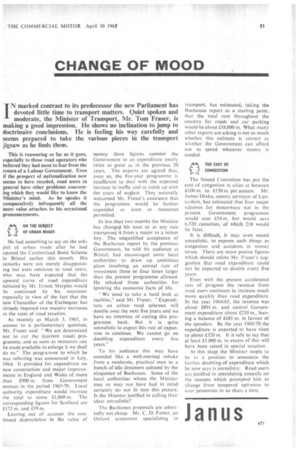CHANGE OF MOOD
Page 55

If you've noticed an error in this article please click here to report it so we can fix it.
IN marked contrast to its predecessor the new Parliament has devoted little time to transport matters. Quiet spoken and moderate, the Minister of Transport, Mr. Tom Fraser, is making a good impression. He shows no inclination to jump to doctrinaire conclusions. He is feeling his way carefully and seems prepared to take the various pieces in the transport jigsaw as he finds them.
This is reassuring so far as it goes, especially to those road operators who believed they had most to fear from the return of a Labour Government. Even if the prospect of nationalization now seems to have receded, road users in general have other problems concerning which they would like to know the Minister's mind. As he speaks it comparatively infrequently all the more value attaches to his occasional pronouncements.
ON THE SUBJECT OF URBAN ROADS
He had something to say on the subject of urban roads after he had opened the Cumberland Basin Scheme in Bristol earlier this month. His remarks were not merely disappointing but even ominous to road users, who may have expected that the upward curve of road expenditure initiated by Mr. Ernest Marples would be continued by his successor especially in view of the fact that the new Chancellor of the Exchequer has already imposed two massive increases in the rates of road taxation.
As recently as March 3, 1965, in answer to a parliamentary question, Mr. Fraser said: "We are determined not to cut the (current road) programme, and as soon as resources can be made available to enlarge it we shall do so." The programme to which he was referring was announced in July, 1964. It provided for expenditure on new construction and major improvements in England and Wales of more than £900 m. from Government sources in the period 1965-70. Local authority expenditure would increase the total to some £1,060 m. The corresponding figures for Scotland are £123 in. and £19 m.
Leaving out of account the continued depreciation in the value of money these figures commit the Government to an expenditure nearly twice as great as in the previous 20 years. The experts are agreed that, even .so, the five-year programme is insufficient to deal with the expected increase in traffic and to catch up with the years of neglect. They naturally Welcomed Mr. Frasees assurance that the programme would be further expanded as soon as resources permitted.
In less than two months the Minister has changed' his tune or at any rate transposed it from a major to a minor key. The unqualified acceptance of the Buchanan report by the previous Government, he told his audience at Bristol. had encouraged some local authorities to draw up ambitious plans involving an annual rate of investment three or four times larger than the present programme allowed. He rebuked those authorities for ignoring the economic facts of life.
" We need to take a hard look at realities," said Mr. Fraser. "Expenditure on urban road schemes will double over the next five years and we have no intention of cutting this programme back. But . it is . quite unrealistic to expect this rate of expansion to continue. We cannot go on doubling expenditure every five years."
To his audience this may have sounded like a well-merited rebuke from a moderate, practical man to a bunch of idle dreamers seduced by the eloquence of Buchanan. Some of the local authorities whom the Minister may or may not have had in mind certainly do not fit into this picture. Is the Minister justified in calling their ideas unrealistic?
The Buchanan proposals are admittedly not cheap. Mr. C. D. Foster, an Oxford economist specializing in transport, has estimated, taking the Buchanan report as a starting point, that the total cost throughout the country for roads and car parking would be about 118,000 rn. What many other experts are asking is not so much whether this estimate is correct as whether the Government can afford not to spend whatever money is needed.
THE COST OF CONGESTION
The Srneed Committee has put the cost of congestion in cities at between £100 rn. to £150 m. per annum. Mr. James Drake, county surveyor of Lancashire, has estimated that four major schemes for motorways not in the present Government programme would cost £54m, but would. save 6,520 casualties, of which 218 would be fatal.
It is difficult, it may even sound unrealistic, to express such things as congestion and accidents in money terms. There are more precise figures which should refute Mr. Fraser's suggestion that road expenditure could not be expected to double every five years.
Even with the present accelerated rate of progress the revenue from road users continues to increase much more quickly than road expenditure. In the year 1964/65, the revenue was about 1891 m. and central Government expenditure about £210 in., leaving a balance of 1681 m. in favour of the spenders. By the year 1969/70 the expenditure is expected to have risen to about £320 m. It is safe to say that at least 11.000 m. in excess of this will have been raised in special taxation.
At this stage the Minister ought to he in a position to announce the further doubling of expenditure which he now says is unrealistic. Road users are justified in speculating uneasily on the reasons which prompted him to change from tempered optimism to sour pessimism in so short a time.




































































































